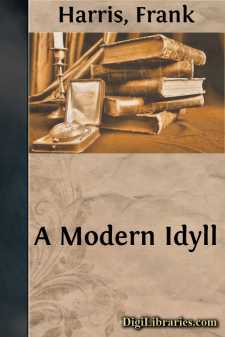Categories
- Antiques & Collectibles 13
- Architecture 36
- Art 47
- Bibles 22
- Biography & Autobiography 811
- Body, Mind & Spirit 110
- Business & Economics 26
- Computers 4
- Cooking 94
- Crafts & Hobbies 3
- Drama 346
- Education 45
- Family & Relationships 50
- Fiction 11812
- Games 19
- Gardening 17
- Health & Fitness 34
- History 1377
- House & Home 1
- Humor 147
- Juvenile Fiction 1873
- Juvenile Nonfiction 202
- Language Arts & Disciplines 88
- Law 16
- Literary Collections 686
- Literary Criticism 179
- Mathematics 13
- Medical 41
- Music 39
- Nature 179
- Non-Classifiable 1768
- Performing Arts 7
- Periodicals 1453
- Philosophy 62
- Photography 2
- Poetry 896
- Political Science 203
- Psychology 42
- Reference 154
- Religion 488
- Science 126
- Self-Help 61
- Social Science 80
- Sports & Recreation 34
- Study Aids 3
- Technology & Engineering 59
- Transportation 23
- Travel 463
- True Crime 29
Gulmore, The Boss
by: Frank Harris
Description:
Excerpt
The habits of the Gulmore household were in some respects primitive. Though it was not yet seven o'clock two negro girls were clearing away the breakfast things under the minute supervision of their mistress, an angular, sharp-faced woman with a reedy voice, and nervously abrupt movements. Near the table sat a girl of nineteen absorbed in a book. In an easy-chair by the open bay-window a man with a cigar in his mouth was reading a newspaper. Jonathan Byrne Gulmore, as he always signed himself, was about fifty years of age; his heavy frame was muscular, and the coarse dark hair and swarthy skin showed vigorous health. There was both obstinacy and combative-ness in his face with its cocked nose, low irregular forehead, thick eyebrows, and square jaw, but the deep-set grey eyes gleamed at times with humorous comprehension, and the usual expression of the countenance was far from ill-natured. As he laid the paper on his knees and looked up, he drew the eye. His size and strength seemed to be the physical equivalents of an extraordinary power of character and will. When Mrs. Gulmore followed the servants out of the room the girl rose from her chair and went towards the door. She was stopped by her father's voice:
"Ida, I want a talk with you. You'll be able to go to your books afterwards; I won't keep you long." She sat down again and laid her book on the table, while Mr. Gulmore continued:
"The election's next Monday week, and I've no time to lose." A moment's silence, and he let his question fall casually:
"You know this—Professor Roberts—don't you? He was at the University when you were there—eh?" The girl flushed slightly as she assented.
"They say he's smart, an' he ken talk. I heard him the other night; but I'd like to know what you think. Your judgment's generally worth havin'."
Forced to reply without time for reflection, Miss Gulmore said as little as possible with a great show of frankness:
"Oh, yes; he's smart, and knows Greek and Latin and German, and a great many things. The senior students used to say he knew more than all the other professors put together, and he—he thinks so too, I imagine," and she laughed intentionally, for, on hearing her own strained laughter, she blushed, and then stood up out of a nervous desire to conceal her embarrassment. But her father was looking away from her at the glowing end of his cigar; and, as she resumed her seat, he went on:
"I'm glad you seem to take no stock in him, Ida, for he's makin' himself unpleasant. I'll have to give him a lesson, I reckon, not in Greek or Latin or them things—I never had nothin' taught me beyond the 'Fourth Reader,' in old Vermont, and I've forgotten some of what I learned then—but in election work an' business I guess I ken give Professor Roberts points, fifty in a hundred, every time. Did you know he's always around with Lawyer Hutchin's?"
"Is he? That's because of May—May Hutch-ings. Oh, she deserves him;" the girl spoke with sarcastic bitterness, "she gave herself trouble enough to get him. It was just sickening the way she acted, blushing every time he spoke to her, and looking up at him as if he were everything. Some people have no pride in them."
Her father listened impassively, and, after a pause, began his explanation:
"Wall, Ida, anyway he means to help Hutchin's in this city election. 'Tain't the first time Hutchin's has run for mayor on the Democratic ticket and come out at the little end of the horn, and I propose to whip him again. But this Professor's runnin' him on a new track, and I want some points about him. It's like this. At the Democratic meetin' the other night, the Professor spoke, and spoke well. What he said was popcorn; but it took with the Mugwumps—them that think themselves too high-falutin' to work with either party, jest as if organization was no good, an' a mob was as strong as an army. Wall, he talked for an hour about purity an' patriotism, and when he had warmed 'em up he went bald-headed for me. He told 'em—you ken read it all in the 'Tribune'—that this town was run by a ring, an' not run honestly; contracts were given only to members of the Republican party; all appointments were made by the ring, and never accordin' to ability—as if sich a ring could last ten years....








